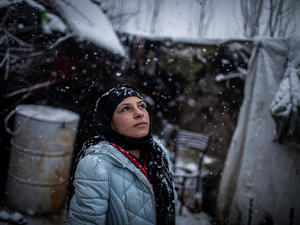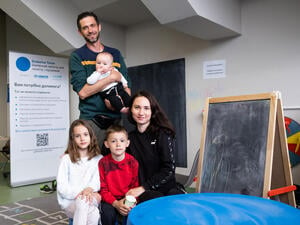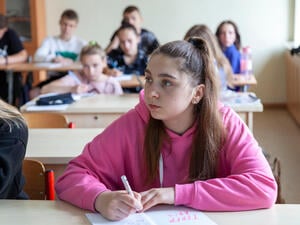Harsh winter makes life even tougher for refugees
Harsh winter makes life even tougher for refugees

Two young mothers wrap their babies in blankets in freezing temperatures in Presevo, Serbia.
PRESEVO, Serbia, Jan 21 (UNHCR) - Harsh winter temperatures and related weather conditions, including heavy snowfalls, are making life even tougher for refugees struggling to overcome obstacles across the southern and eastern Balkan Peninsula, Turkey, the eastern Mediterranean and the Middle East.
Temperatures in southern Serbia have dropped to -15 C in recent days. Refugees arriving from Macedonia now have to walk in snow for more than two kilometres across frozen fields in the border zone.
On Wednesday, off the Greek island of Lesvos - buffeted by ice cold winds, snowfalls in the north and sleet in the south - a three year-old Syrian boy and a 43 year-old Syrian woman died of suspected hypothermia in two separate incidents despite efforts of the Greek coast guard and volunteers to save their lives. They had fallen in the water from smuggling boats which are still bringing an alarmingly high number of people across the Aegean from Turkey.
Croatia has also seen temperatures drop to -12 C at night. In response, police have reduced waiting times at the Slavonski Brod Winter Reception and Transit Center (WRTC) by disembarking refugees from arriving trains one wagon at a time. The UN Refugee Agency, UNHCR, has meanwhile distributed winter clothes and blankets after registration and provided hot drinks for cold refugees.
UNHCR has also assisted the government by providing winterized accommodation in three large heated tents at the WRTC for as many as 1,500 people. Government and other partners provide warm accommodation for an additional 3,500 people.
The majority of refugees are insufficiently dressed for the weather, have no winter boots, and many already have health problems due to cold weather elsewhere.

Kids playing around on train tracks near Presevo, Serbia on January 20, 2016.
Meanwhile, in Lebanon's Bekaa Valley, where some148,000 Syrian refugees live in nearly 3,000 informal settlements, temperatures are expected plunge to lows of -7 C in coming days, with occasional snow showers.
To safeguard refugees, many of them families with young children, UNHCR has weatherproofed and insulated tents and other shelters, and installed drainage systems to minimize flooding from thawing snows. UNHCR has also distributed plywood and timber to reinforce the refugees' makeshift dwellings to withstand buffeting from the wind, as well as snow and rain.
In addition, UNHCR and its partners have distributed cash to refugees so that they can buy much-needed items like fuel for heating and warm clothing.
"With the winter assistance, my husband bought some fuel for the stove and I bought some warm clothes for my five children," said Syrian mother Watfa, who is spending her second winter in one of the coldest spots in Lebanon. "With food assistance, I was able to stock up some necessities like rice and beans in case we are snowed in for a few days."
Back in Serbia, UNHCR provides buses that take people from the border with Macedonia to the reception centre in Presevo.
However, many refugees then opt to take a 12-hour onward train trip to the town of Sid on the border with Croatia. Before they get on board, refugees sometimes wait for hours in the open.
There is no place for mothers to feed them, and numerous layers of blankets do not protect them from the cold. By the time train arrives and people rush to get on board, many can barely move due to the cold.
"Do you really think we would take this dangerous journey and freeze out there if we were safe in Syria?" one traveller, Mahmoud, asked. Together with his wife and two children, age four and four months, they have been standing on a platform covered in ice and snow at the Presevo train station for more than three hours.
UNHCR works in day and night shifts to provide the very first assistance and ensure that refugees, especially families with small children, are accommodated in heated refugee housing units as soon as possible, and that those with serious health problems are referred to doctors in hospitals.
At the reception centre in Presevo, UNHCR and partners together with authorities provide refugees with food, hot tea, warm clothes, blankets and other items, as well as medical assistance. There are showers with hot water and changing rooms, special places for children with toys and games, and rooms for women with babies.
There are also heated places to overnight, however, only those arriving late at night or families who have ran out of their savings, choose to stay behind.
Ali, a man in his mid-40s, is among 300 people waiting for a train to come. He left Aleppo in Syria and crossed the sea with his wife and nine children a few weeks ago. "We just had to make the decision - either we get killed in our hometown or we take this route and risk to die at the sea," said Ali, wrapped in a blanket.
Here is a link to the UNHCR data portal.
By Liene Veide, Serbia and Tatiana Audi, Lebanon.








